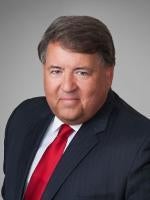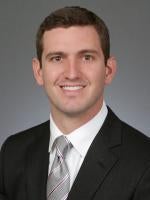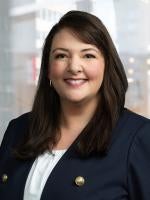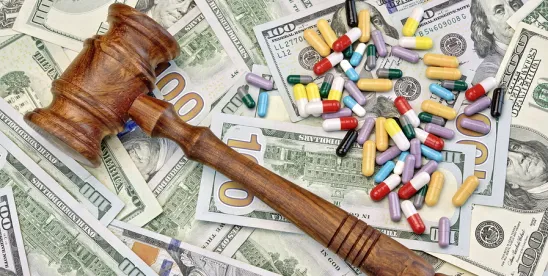On December 27, 2024, the U.S. Court of Appeals for the Second Circuit held in U.S. ex rel. Camburn v. Novartis Pharmaceuticals Corporation that a relator adequately pleads a False Claims Act (“FCA”) cause of action premised on violation of the Anti-Kickback Statute (“AKS”) by alleging, with sufficient particularity under Federal Rule of Civil Procedure 9(b) (“Rule 9(b)”), that at least one purpose (rather than the sole or primary purpose) of the alleged kickback scheme was to induce the purchase of federally reimbursable health care products or services.[1]
In doing so, the Second Circuit joins seven other Circuit Courts—the First, Third, Fourth, Fifth, Seventh, Ninth, and Tenth Circuits—in adopting the “at least one purpose” rule. This ruling lowers the bar in the Second Circuit for relators pleading AKS-based FCA claims.
Interplay Between FCA and AKS Violations
Under the AKS, “a claim that includes items or services resulting from a violation [of the AKS] … constitutes a false or fraudulent claim” under the FCA.[2]
The AKS prohibits persons from, among other things, “knowingly and willfully” soliciting or receiving “any remuneration (including any kickback, bribe, or rebate) directly or indirectly, overtly or covertly, in cash or in kind—
- in return for referring an individual to a person for the furnishing or arranging for the furnishing of any item or service for which payment may be made in whole or in part under a federal health care program, or
- in return for purchasing, leasing, ordering, or arranging for or recommending purchasing, leasing, or ordering any good, facility, service, or item for which payment may be made in whole or in part under a Federal health care program[.]”[3]
Alleged “Sham” Speaker Events & Excessive Compensation
In U.S. ex rel. Camburn, the relator, a former Novartis sales representative, filed a qui tam action in the U.S. District Court for the Southern District of New York alleging violations of the FCA premised on violations of the AKS. The relator alleged that Novartis operated a kickback scheme with the intent of bribing providers to prescribe Gilenya, a multiple sclerosis drug. Specifically, the relator alleged that Novartis operated a sham peer-to-peer speaker program that served as a mechanism for the company to offer remuneration to physicians in exchange for prescribing Gilenya. The relator alleged that the payments made to providers under the guise of this speaker program “caused pharmacies and physicians to submit false claims to the government and to the states for healthcare reimbursement under programs including Medicare Part D, Medicaid, and TRICARE.”[4]
U.S. District Court’s Dismissal with Prejudice
The federal government, as well as 29 states and the District of Columbia, among other parties, declined to intervene in the lawsuit. After granting the relator multiple opportunities to amend his complaint to plead factual allegations with sufficient particularity required by Rule 9(b), the district court held that the relator still failed to adequately plead the existence of a kickback scheme. Because the relator’s FCA claim was based on violations of the AKS, the district court dismissed the relator’s Third Amended Complaint with prejudice and did not address whether the relator sufficiently pled the remaining elements of his FCA claim.
Second Circuit’s Adoption of “At Least One Purpose” Rule
On appeal, the Second Circuit adopted the “at least one purpose” rule and found that, to survive dismissal, the relator “needed only to allege that at least one purpose of the remuneration was to induce prescriptions, without alleging a cause-and-effect relationship (a quid pro quo) between the payments and the physicians’ prescribing habits.”[5] Applying this standard, the Second Circuit concluded that the relator adequately pleaded an AKS violation with respect to the following three categories of allegations: (1) holding “sham” speaker events with no legitimate attendees, (2) excessively compensating physician speakers for canceled events, and (3) deliberately selecting and retaining certain speakers to induce a higher volume of prescriptions of Gilenya.
Specifically, the Second Circuit found that the relator’s “illustrative examples” of physician-speakers presenting solely to other Novartis speakers or to members of their own practice over lavish restaurant meals supported a strong inference that at least one purpose of the speaker program was to provide kickbacks to prescribers. The panel also found that the relator’s allegations that the compensation paid to physician speakers for canceled events ($20,000 to $22,500 to each speaker) over a two-year period in comparison to the dollar value of the allegedly fraudulent claims submitted to the government for reimbursement (between to $1 to $1.7 million) during that same period gave rise “to a strong inference that the payments constituted, at least in part, unlawful remuneration.”[6] Likewise, the relator’s inclusion of testimony from two Novartis sales representatives regarding the company’s alleged practice of offering speaking engagements to physicians to incentivize them to prescribe Gilenya suggested that these engagements were organized to induce providers to prescribe the drug.
The Second Circuit held that these allegations, accepted as true for purposes of the motion to dismiss, “plausibly and ‘strongly’ suggest Novartis operated its speaker program at least in part to remunerate certain physicians to prescribe Gilenya.”[7] Accordingly, the Second Circuit remanded the case to the district court to determine whether the relator sufficiently pleaded the remaining elements of his FCA claim and to weigh the adequacy of the claims under state and municipal law.
The Second Circuit affirmed, however, the district court’s conclusion that the relator “failed to link Novartis’s DVD initiative, ‘entertainment rooms,’ visual aids for billing codes, and one-on-one physician dinners with a strong inference that Novartis used these tools, at least in part, to induce higher prescription-writing,” with the caveat that another FCA claim predicated on an AKS violation may in fact survive dismissal if similar facts were pleaded with greater particularity.[8]
Practical Takeaways
- This case highlights the importance of drug manufacturers and other regulated entities’ duty to implement robust and ongoing health care compliance programs in order to continuously and thoroughly evaluate enforcement and whistleblower risk relative to marketing and other business activities.
- This decision’s adoption of the “at least one purpose” rule lowers the bar for relators in the Second Circuit to plead FCA violations premised on noncompliance with the AKS. Indeed, the Second Circuit rejected arguments that remuneration is unlawful under the AKS only if the “sole purpose” or “primary purpose” of the payment is to induce health care purchases. As eight circuits across the country have now held, allegations involving a single improper purpose can allow a case to survive dismissal. In these circuits, a relator merely needs to allege that at least one purpose of the remuneration was to induce the purchase of federally reimbursable health care products or services.
- The heightened Rule 9(b) pleading standard fully applies in FCA cases premised on AKS violations. While the “at least one purpose” rule broadens liability, the district court and Second Circuit made clear that FCA allegations will be scrutinized to ensure they comport with the heightened Rule 9(b) pleading requirements.
Epstein Becker Green Attorney Ann W. Parks contributed to the preparation of this post.
ENDNOTES
[1] 2024 WL 5230128 (2d Cir. Dec. 27, 2024).
[2] 42 U.S.C. § 1320a-7b(g).
[3] Id. at § 1320a-7b.
[4] Camburn, 2024 WL 5230128, at *2.
[5] Id. at *4.
[6] Id. at *6.
[7] Id. at *6 (cleaned up) (quoting Hart, 96 F.4th 145, 153 (2d Cir. 2024)).
[8] Id. at *19.







 />i
/>i

